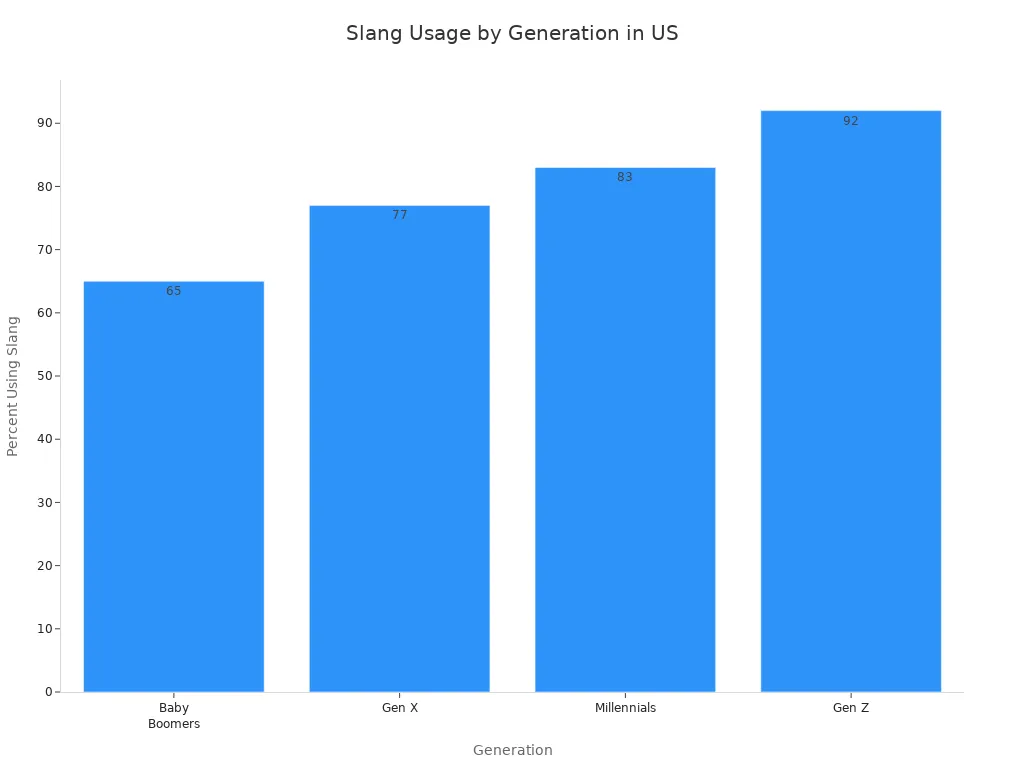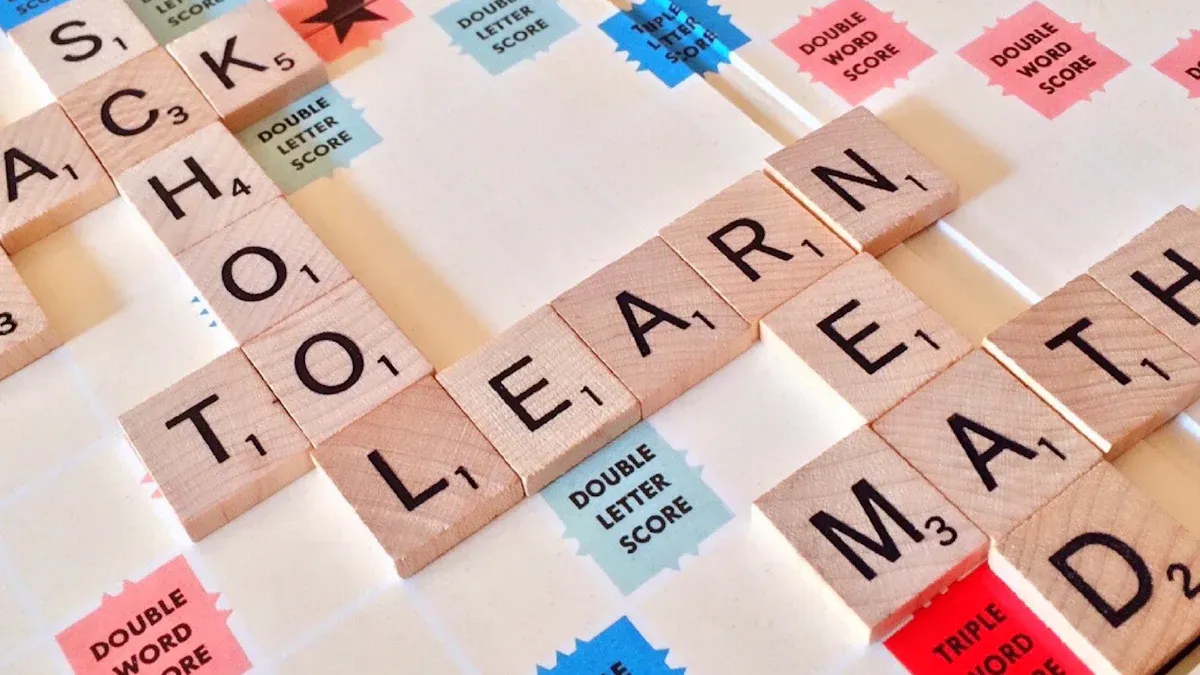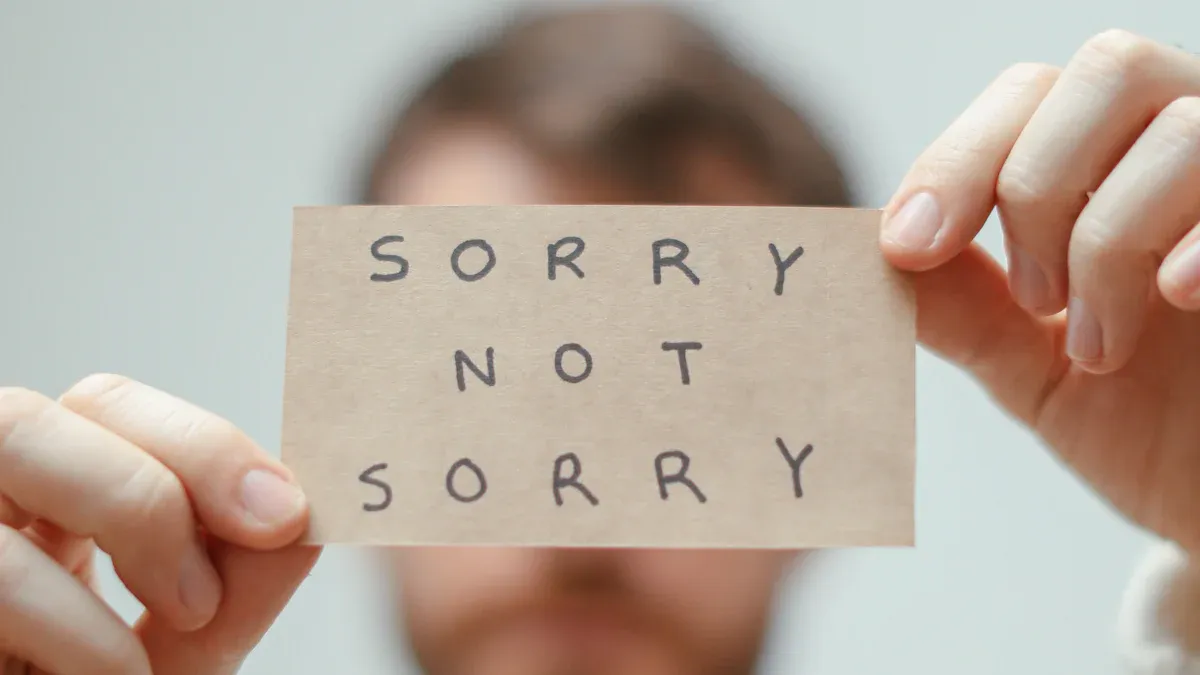- EasyCard
- Trade
- Help
- Announcement
- Academy
- SWIFT Code
- Iban Number
- Referral
- Customer Service
- Blog
- Creator
Top American Slang Words Aussies Should Learn This Year

Image Source: pexels
Ever heard someone in a movie say what’s up or no cap and wondered what they meant? American lingo pops up everywhere, from TikTok to your favorite TV shows. You hear bet when friends agree and bussin’ when food tastes amazing. If you plan to visit the US or just want to keep up online, knowing these american slang terms helps you fit in and avoid confusion. Over 80% of people in the US use slang, and it shows up most with friends and family.
| Slang Term / Usage Aspect | Statistic / Description |
|---|---|
| Most popular slang term | “Rona” (short for coronavirus) used by 42% of Americans |
| Other popular terms | “jab” (vaccine shot) 35%, “quarantine and chill” 34%, “maskne”, “long-hauler”, “ghost kitchen” |
| Percentage using slang overall | 80% of respondents use slang |
| Frequency of slang use | 52% use slang in most or all conversations |
| Slang use by social context | Friends 75%, Family 64%, Strangers 12%, Boss 10% |
| Slang use by personality type | Introverts 81% use slang, 54% use it in most/all conversations |
| Slang use by parental status | Parents more likely to use slang; 7 in 10 learn slang from young people |
| Slang use by generation | Baby Boomers 65%, Gen X 77%, Millennials 83%, Gen Z 92% |
| Most common slang by generation | Boomers: “woke”; Gen X: “ghosted”; Millennials: “salty”; Gen Z: “low-key” |
| Most annoying slang terms | “OK boomer” and “bae” (29%), “Bye, Felicia” (28%) |
| Acceptability of slang use | Family events 75%, Siblings 83%, Parents 69%, Grandparents 59%, Romantic settings 69% |
| Dealbreaker if slang overused | 63% on first dates, over 50% in intimate settings |

Pick up american lingo and you will join the 75% of Americans who use slang with friends. Try it out and see how much more fun your chats become!
Key Takeaways
- Learning American slang helps Aussies understand conversations, enjoy travel, and connect with Americans online.
- Popular slang like ‘bet,’ ‘bussin’,’ and ‘no cap’ come from social media and youth culture, especially Gen Z.
- Use slang naturally by practicing in casual settings and listening to how Americans speak to avoid sounding forced.
- Avoid Aussie slang in the US to prevent confusion; use common American words instead.
- Keep up with new slang by using online dictionaries, watching TV shows, and following American creators on social media.
Why Learn American Lingo?

Image Source: pexels
Travel and Everyday Use
When you travel to the United States, you will hear american lingo everywhere. People use slang in shops, restaurants, and even when you hang out with new friends. If you know these terms, you can order food, ask for directions, or join a conversation without feeling lost. You might hear someone say, “That burger is bussin’,” or “Let’s hang out later.” If you understand these phrases, you will feel more confident and enjoy your trip even more.
Learning american lingo also helps you in daily life. Many Aussies chat with Americans online or play games with them. If you know the right slang, you can make friends faster and avoid awkward moments. You will also spot these terms in movies, music, and TV shows. When you understand what people mean, you can laugh at the jokes and join in the fun.
Tip: Try using a new slang word each day when you talk to friends or comment online. You will remember it better and sound more natural.
Pop Culture and Social Media
American slang spreads quickly through pop culture and social media. You see new words on TikTok, Instagram, and YouTube almost every week. Many Australians pick up slang from these platforms, and about half learn new words from social media. When you use american lingo, you show that you know what’s trending and that you belong to a global community.
- Australian English is changing because of american lingo and pop culture.
- New slang often starts in music, movies, or viral videos.
- Young people use these terms to show they are part of the group.
- Most Aussies learn slang from friends or by hanging out online.
Some american slang words, like “sigma” or “skibidi,” become popular worldwide in just days. Even though not every term sticks around, using the latest slang helps you connect with others and stay in the loop. American slang has shaped youth culture in Australia for years, mixing with local words and making conversations more fun.
Trending American Slang

Image Source: pexels
Gen Z Slang
If you want to sound like a local on TikTok or in a college group chat, you need to know the most popular gen z slang. These words change fast, but some stick around because everyone loves using them. Gen z slang often comes from social media, music, and even viral memes. You will hear these words in college slang, online games, and even in everyday chats with your bestie.
Here are some of the most used slang words for 2025:
| Slang Term | Meaning | When to Use | Example |
|---|---|---|---|
| bet | A quick way to say “okay” or “deal” | When you agree with someone | “You coming to the party?” – “Bet, I’ll be there.” |
| bussin | Something really good, especially food | When you love what you’re eating | “This pizza is bussin!” |
| extra | Over the top or dramatic | When someone is doing too much | “You don’t have to be so extra about it.” |
| GOAT | Greatest Of All Time | Talking about the best person or thing | “That player is the GOAT.” |
| GRWM | Get Ready With Me (vlog style) | When sharing your routine online | “GRWM for my first day at college.” |
| IYKYK | If you know, you know | For inside jokes or hidden gems | “That secret taco spot is amazing. IYKYK.” |
| mid | Just average, not great | When something is unimpressive | “The new movie was kind of mid.” |
| no cap | Being honest, not lying | To stress you mean what you say | “No cap, that test was hard.” |
| tea | Gossip or secrets | When sharing juicy news | “Spill the tea, bestie!” |
| vibe check | Checking if someone is having a good time | To see how someone feels | “Vibe check! You good?” |
| slay | To do something really well or look amazing | When someone nails it | “You slayed that presentation!” |
| rizz | Flirting skill or charm | When someone is smooth | “He’s got rizz for days.” |
| situationship | A relationship that’s not official | When things are complicated | “We’re not dating, it’s more of a situationship.” |
| bestie | Close friend | When talking to or about your friend | “Hey bestie, what’s up?” |
| living rent-free | Something you can’t stop thinking about | When a thought sticks in your mind | “That song is living rent-free in my head.” |
Note: Gen z slang often comes from African American Vernacular English (AAVE) and spreads through social media. You will see words like “bussin” and “no cap” everywhere, but some terms, like “bet,” are just part of youth culture and not tied to a specific region.
Gen z slang moves fast. Social media, especially TikTok and YouTube, help new words go viral overnight. You might see tier lists online ranking current slang from S-tier (legendary) to F-tier (outdated). These lists show which words are hot right now. For example, “rizz,” “skibidi,” and “fanum tax” are S-tier in 2025. If you want to keep up, you need to watch what’s trending in college slang and meme culture.
Gen z slang is different from what older generations use. It changes quickly and often marks who is “in the know.” Some words, like “ghosted” or “FOMO,” cross over to older groups, but most popular gen z slang stays with young people. You might hear your bestie say “lit” or “fam” at a party, but your parents might not get it. Gen z also switches up their language depending on where they are—school, home, or online.
No Cap and Other Expressions
Some current slang words have deep roots in culture and music. “No cap” is one of the most important. It started in African American Vernacular English and hip-hop, especially in the Southern US. “Cap” means to lie or exaggerate, so “no cap” means you are telling the truth. You use it to show you are serious or not joking. For example, you might say, “No cap, that was the best burger I’ve ever had.” Rappers like Megan Thee Stallion and Future helped make “no cap” famous, and now you see it everywhere, from college slang to social media.
Other current slang words you need to know:
- Bet: You use this when you agree or confirm plans. It’s quick and easy. “Bet, I’ll see you at 8.”
- Bussin: This word started in AAVE and means something is really good. It first described food but now can mean anything awesome. “These fries are bussin.”
- IYKYK: Short for “if you know, you know.” You use it for inside jokes or things only some people understand. “That hidden coffee shop is the best. IYKYK.”
- Situationship: This is a relationship that isn’t official. It’s more than friends but not quite dating. “We’re in a situationship, not a real relationship.”
- Bestie: Your closest friend. You can call anyone you trust your bestie. “Thanks for the help, bestie!”
- Lit: Something exciting or fun. “That concert was lit.”
- Living rent-free: When you can’t stop thinking about something. “That meme is living rent-free in my head.”
Tip: If you want to sound natural, listen to how people use these words in college slang or on social media. Try using them in your own chats with friends or online. You will pick up the right vibe and avoid sounding awkward.
Current slang changes all the time. Linguists and language experts track which words are trending by watching social media, viral videos, and even celebrity posts. They look at how often people use a word and how it spreads. Some words, like “slay” or “rizz,” come from specific communities or creators. Others, like “bet” or “lit,” just catch on because they are easy to use and fun to say.
If you want to keep up with the most popular gen z slang, pay attention to what’s happening online. College slang, meme culture, and viral trends all help shape what words you will hear next. Try using these expressions in your own conversations. You will sound more confident, connect with others, and maybe even teach your friends a thing or two.
Using Slang Naturally
Sounding Authentic
You want to sound like a local, not like you just memorized a slang dictionary. The best way to use American slang is to practice often. Try using new words in real conversations, even if you feel a bit awkward at first. If you mess up, just laugh it off and say, “i dunno, I’m still learning!” Most Americans will appreciate your effort and might even help you out.
Here are some tips to help you sound more natural:
- Use slang that fits the situation. If you’re talking to a friend, saying “spill the tea” or “for real, dude?” feels right. In a job interview, stick to standard English.
- Don’t overdo it. You do you, but using too much slang can sound forced. Mix in a few words like “omg” or “get off my back” when it makes sense.
- Listen to how Americans use slang. Notice when someone says “spill the tea” or calls someone a “third wheel.” Copy their tone and timing.
- Admit you’re learning. If you use an idiomatic phrase and someone looks confused, explain it. Say, “That means I want to hear the gossip, for real.”
- Focus on common slang. Some words are only popular in certain regions. You do you, but stick to safe choices like “dude” or “i dunno” until you feel confident.
Tip: If you ever feel lost, just ask what a word means. Most people love to explain their favorite slang.
Common Mistakes
Aussies sometimes use words that Americans don’t get. For example, if you say “arvo” instead of “afternoon,” you might get a blank stare. The same goes for “servo” or “bikkie.” Here’s a quick guide to avoid confusion:
| Aussie Word | What You Mean | Say This in the US | Why It Matters |
|---|---|---|---|
| arvo | afternoon | afternoon | Americans don’t use “arvo” |
| Maccas | McDonald’s | McDonald’s | “Maccas” is not common |
| heaps | a lot | a lot | “Heaps” can sound funny |
| bikkie | cookie | cookie | “Bikkie” is confusing |
| third wheel | extra person | third wheel | This one works in both countries |
| get off my back | stop nagging | get off my back | This is used in the US too |
You do you, but try to use American words when you’re in the US. Avoid abbreviations like “kindie” or “chewy.” If you want to blow off steam, say so! And remember, “omg, I dunno why I said that” works everywhere.
Staying Updated
Resources and Tools
You want to keep up with the latest American slang, right? New words pop up all the time, especially on social media. A study found that over fifty new slang words can appear in just one year, often spreading fast on platforms like Twitter. If you want to track these changes, you have some great options.
- Urban Dictionary and Slang.net are popular online slang dictionaries. You can look up new words and see how people use them in real life.
- Dictionary of American Regional English helps you learn about slang from different parts of the United States.
- Watching movies like “Clueless,” “Mean Girls,” or “Superbad” gives you a feel for how slang sounds in conversation.
- TV shows such as “Friends,” “The Office,” and “How I Met Your Mother” use lots of everyday slang.
- Music, especially hip-hop and rap, often introduces new words and phrases.
- Social media platforms like TikTok and Twitter are the fastest way to spot trending slang.
Tip: Try listening to podcasts or watching YouTube videos from American creators. You will hear slang in context and pick up the right way to use it.
Language learning apps can help too. Some apps give you instant feedback, audio clips, and even chatbots to practice with. A few apps let you adjust how formal or informal you want to sound. Just remember, apps work best when you also talk with real people.
Practice Tips
You learn slang best by using it. Experts say you should watch movies and TV shows to hear how people really talk. Social media is another great place to see slang in action. Try following American creators on TikTok or Instagram. You will notice which words are hot right now.
Here are some ways to practice:
- Look up new words on Urban Dictionary to check their meaning.
- Chat with native speakers online or in person. They can help you use slang the right way.
- Work with a language tutor who knows American slang. Tutors can explain when and how to use each word.
- Join online groups or forums where people use lots of slang. You can read, listen, and join the conversation.
- Practice using new words in your own sentences. Try them out with friends or in comments online.
Note: Always pay attention to the situation. Some slang works with friends but not in formal settings. If you are not sure, listen first and then try it yourself.
Slang changes quickly, so stay curious and keep exploring. You will sound more natural and confident every day.
You can make your chats more fun by trying out new American slang with friends or online. Slang helps you connect and share a laugh. Stay curious and keep learning—there are cool quizzes out there to test your skills. For example, check out these popular options:
| Quiz Name | Creator | Plays | Rating | Focus Area |
|---|---|---|---|---|
| American to Australian Words | rachelx | 690 | 5.00 | American to Australian slang quiz |
| Australian to US Vocabulary | rachelx | 24 | N/A | Australian to American vocabulary |
Share your favorite slang or a funny story in the comments. You might teach someone a new word today!
FAQ
What does “no cap” mean?
You say “no cap” when you want to show you are telling the truth. It means you are not joking or exaggerating. For example, “No cap, that burger was amazing.”
Can I use American slang in formal situations?
You should avoid slang in formal settings like job interviews or business meetings. Stick to standard English. Save slang for friends, social media, or casual chats.
How do I know if a slang word is still popular?
Check TikTok, Twitter, or Urban Dictionary. If you see a word used often, it is probably still trending. Ask American friends or watch recent TV shows for the latest lingo.
Will Americans understand Aussie slang?
Most Americans do not know Aussie slang like “arvo” or “bikkie.” If you want to avoid confusion, use American words when talking to people in the US.
Mastering American slang like “bussin’” or “no cap” helps Aussies connect with U.S. culture, but managing finances across borders is equally key for travel or online interactions. For seamless global payments, try BiyaPay. BiyaPay offers transfer fees as low as 0.5%, a stark contrast to traditional bank charges like SWIFT, which can hit $50. With real-time exchange rate transparency, you can convert over 30 fiat currencies or 200+ cryptocurrencies, perfect for paying for U.S. travel, online purchases, or sending money to friends abroad. Covering 100+ countries with same-day transfers, BiyaPay ensures your funds move fast. Registration is quick, taking minutes with simple identity verification—no complex paperwork. Backed by New Zealand financial licensing and robust security, BiyaPay keeps your transactions safe. Whether you’re vibing with new slang or booking a U.S. trip, BiyaPay simplifies cross-border finances. Join BiyaPay today to stay fluent in both slang and global payments!
*This article is provided for general information purposes and does not constitute legal, tax or other professional advice from BiyaPay or its subsidiaries and its affiliates, and it is not intended as a substitute for obtaining advice from a financial advisor or any other professional.
We make no representations, warranties or warranties, express or implied, as to the accuracy, completeness or timeliness of the contents of this publication.




Contact Us
Company and Team
BiyaPay Products
Customer Services
is a broker-dealer registered with the U.S. Securities and Exchange Commission (SEC) (No.: 802-127417), member of the Financial Industry Regulatory Authority (FINRA) (CRD: 325027), member of the Securities Investor Protection Corporation (SIPC), and regulated by FINRA and SEC.
registered with the US Financial Crimes Enforcement Network (FinCEN), as a Money Services Business (MSB), registration number: 31000218637349, and regulated by FinCEN.
registered as Financial Service Provider (FSP number: FSP1007221) in New Zealand, and is a member of the Financial Dispute Resolution Scheme, a New Zealand independent dispute resolution service provider.



















